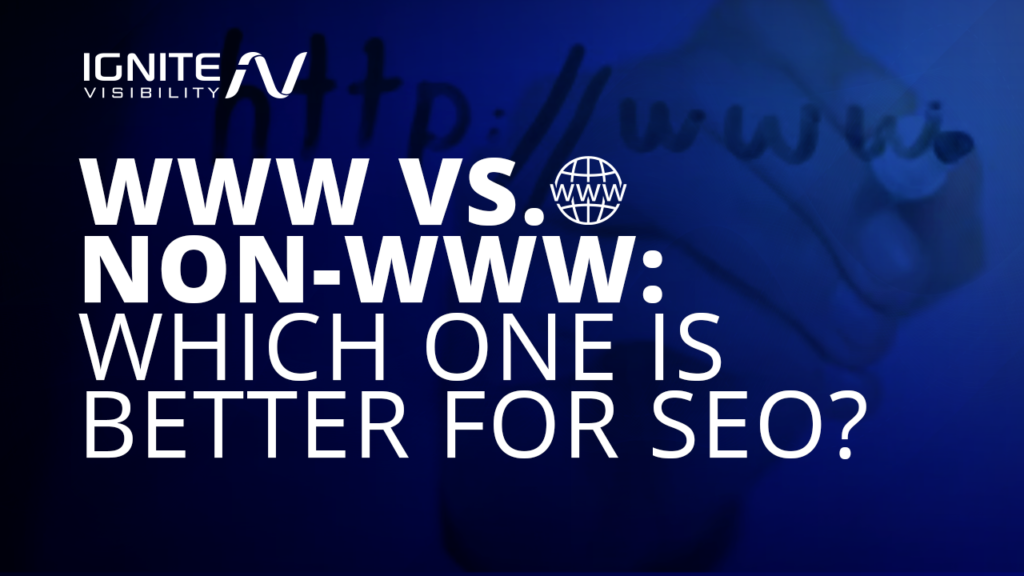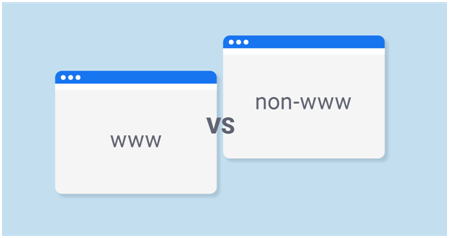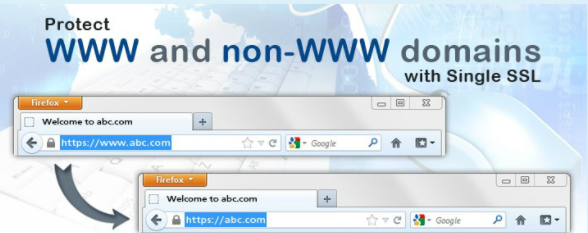Is www or non-www better for SEO?
Short answer: In most cases, it doesn’t make a huge difference either way to the search engines.
But there’s more to the story.
For most people, the www vs. non-www difference doesn’t really mean anything.
For SEO specialists and web designers, however, those three additional letters do bear some significance.
In this post, we’re going to look at www vs. non-www domain names so you can decide which type you want to implement in your business.

WWW vs. Non-WWW
What We’ll Cover:
- What’s the Difference Between WWW vs. Non WWW?
- Do You Need WWW?
- Pros and Cons of WWW vs. Non-WWW
- Do You Need Two Different SSL Certificates for WWW and Non-WWW Domains?
- Which One is Better for SEO?
- Which is Better for WordPress?
What’s the Technical Difference Between WWW vs. Non-WWW?
Developed by computer scientist Tim Berners-Lee in 1989, the World Wide Web officially became open to the public in 1991.
Since then, there has been a split between two major factions—those who use www and those who do not when typing a web address in the search bar.
There is only one main technical difference between these two types of URLs and Google doesn’t have a preference for one or the other.
Before we get into what that www vs. non-www difference is, here’s how the URL will look to the user:
URLs with www:
- https://www.businessname.com
- https://www. businessname.com
URLs without www:
- https:// businessname.com
- https:// businessname.com
A non-www domain is often referred to as a “naked” domain. When you add the www prefix in front of the site name, it operates as a sort of hostname which can help adjust to domain name system (DNS), as well as restrict cookies with more than one subdomain. DNS is essentially a protocol that converts domain names into IP addresses.
Typically, smaller websites won’t be affected no matter which format you choose, but www in the URL does contain more technical benefits when implemented on larger sites.
It’s also important to note that if you have both a www and non-www URL, search engines like Google will view them as two distinct sites. That’s why you need to specify which URL you prefer Google to index.
Do You Need WWW?
Historically, typing www before the web address would tell the computer that you were trying to get to a web page.
But, when’s the last time you actually typed ‘www’ at the beginning of a URL? Probably not in a while.
That should tell you that we don’t really need them anymore. You can just type the name of the site and the .com or .org and navigate right to where you’re trying to go.
It wasn’t always like this, though.
Back in the day, a domain had several types of servers—Web, FTP, mail, IRC, gopher, etc. The subdomain prefix was used to identify the type of server and they often had different IP addresses.
Nowadays, the web has emerged as the most popular application on the internet. FTP and mail servers still exist (gopher and IRC not really as much), but since they usually share the same IP address, the prefix is no longer required.
Google webmasters began to notice that people were manually typing in the URLs, excluding the www. As a result, the non-www domain became the preferred variant.
But ultimately, it all comes down to your personal preference.

WWW vs. Non-WWW
A few things to keep in mind though regardless of which one you choose:
- Configure your website to ‘listen’ to either the www variation or non-www variation.
- Communicate to Google and other search engines so they know what your preferred choice is.
- Remain consistent and use the selected variation when adding internal links and when running link building campaigns.
Pros and Cons of WWW vs. Non-WWW
Now that we’ve outlined some of the minor differences between the two URLs, let’s discuss the pros and cons of both.
WWW URL Pros
- Convenient for searchers to type the domain with www because all websites began with www at one point.
- www URL allows you to set cookies for your specific www subdomain.
- Website with www may appear more authentic than non-www URLs.
WWW URL Cons
- Most users don’t type www anymore when searching the web.
- Since Google favors shorter URLs, the www prefix makes the URL much longer.
Non-WWW URL Pros
- With the non-www domain, you don’t have the option to restrict cookies just to the root domain.
- Non-www domains don’t have CNAME records, which means you cannot redirect traffic from one server to the other.
Non-WWW URL Cons
- It’s much easier and faster for the users to just type the domain in the search.
- With the domain name being four characters shorter, it may have an impact on the search engine’s loyalty.
Do You Need Two Different SSL Certificates for WWW and Non-WWW Domains?
Whenever a new website is created, questions surround website security and SSL certificates will arise, specifically around www vs. non-www SSL.
Since SSL is an encryption-based protocol, it only secures the domain for which it has been issued.
In the case of www vs. non-www SSL, there are a few ways you can protect both domains using a single certificate:
- Purchase an SSL certificate from brands that provide the advanced feature of securing both domains via a single certificate like Comodo, RapidSSL, and GeoTrust.
- Redirect the non-www domain to the www domain.
- Install the Wildcard SSL certificate.
Which One is Better for SEO?
From an SEO perspective, www has a slight advantage over non-www.
The main thing you need to keep in mind is that your website must not be reached by two URLs—https://businessname.com and https://www.businessname.com.
What’s most important is that you remain consistent with the URL setup you chose initially; meaning, if you started your website using www, don’t simply create a non-www version and expect it to retain the same authority.
In fact, when both website URLs are working, Google will view it as two different websites, resulting in duplicate content.
And when Google sees duplicate content or entire duplicate websites, Google can penalize these sites and exclude them from search results.
If you have tested your website and noticed duplicates such as URLs with www and without www, you need to facilitate a 301 redirection from one version to another which is the main URL.
For example, redirect from https://www.businessname.com to https://businessname.com.
This enables you to preserve both your content and link weight.
Which is Better for WordPress?
Most WordPress website owners have decided to do away with www because users tend to search for websites without it, as we covered earlier.
With www or non-www, WordPress can restrict cookies when using subdomains, which can make your WordPress site operate a little faster.
Opting for www over non-www can also provide you with more flexibility with DNS.
For effective use of CDN and cloud hosting, using the www hostname with your domain is necessary, especially if you’re running a larger site.
Doing so also enables you to use CDN for serving static content.
It’s safe to say in the battle of www vs. non-www, WordPress slightly favors using www over non-www URLs.
Wrapping Up
Choosing between www vs. non-www doesn’t have to be such a tough decision.
As previously mentioned, there isn’t a substantive difference between the www domain and the non-www domain.
But depending on your taste, usability, or brand, we’re sure you’ll make the right choice for your business!

